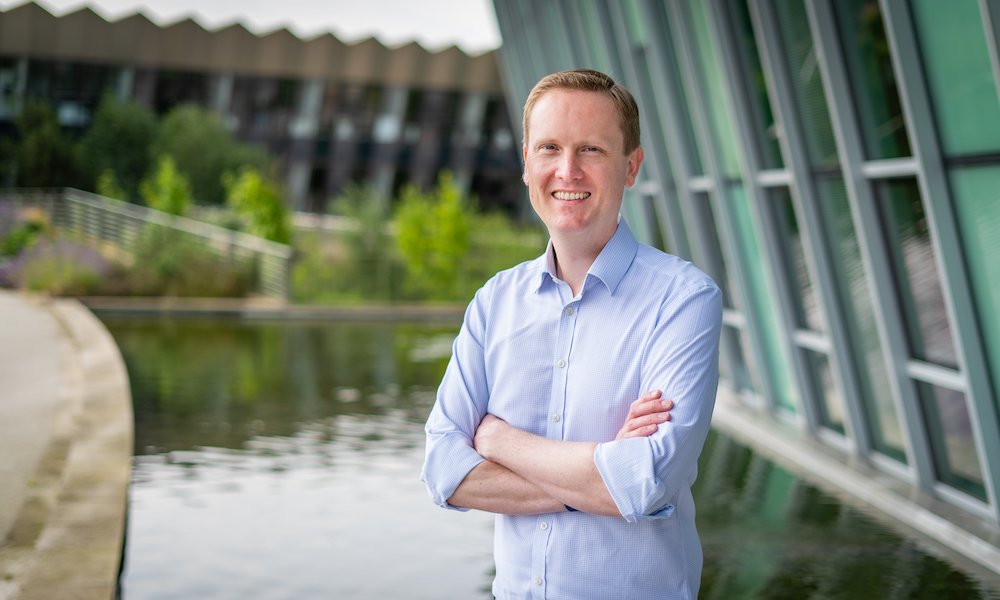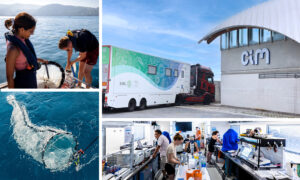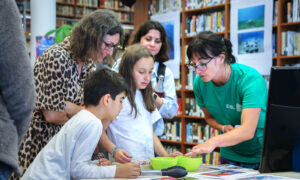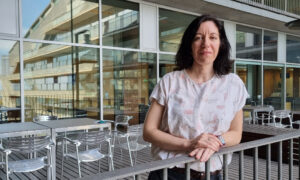
Welcome: David Hulcoop
David Hulcoop discusses how his experience bridging organisational cultures will help address critical challenges in drug discovery and target selection at Open Targets

Open Targets is a public-private partnership which aims to use the information generated by genome sequencing and genetic studies to systematically improve the identification and prioritisation of drug targets for safe and effective medicines. EMBL-EBI is one of the founding partners in the Open Targets consortium.
David Hulcoop, previously Strategy and Operations Director for the consortium, starts as Executive Director of Open Targets in October 2023.
We found out more about how his background in industry motivated him to work on the problem of target selection at Open Targets, and the challenges of bridging disciplines and ways of working across industry and academia.
What is your professional background?
I’m a chemist by training. After completing my PhD in organic chemistry at the University of Cambridge, I went to Canada as a Leverhulme Trust postdoctoral fellow. I then moved back to the UK to work as a process chemist at GSK, designing the manufacturing routes for small molecule drugs. This involves scaling up the process of making a few grams of the compound in the lab to hundreds of tonnes in a factory, in an environmentally-friendly, cost-effective way.
Process chemistry is incredibly multidisciplinary: in addition to chemists, you need analytical teams to make sure everything is 99.9% pure. You need engineers to ensure that what you build in the lab can be made in a factory. You need factory teams to implement the processes. These very large teams need to stay on track to hit delivery milestones for clinical trials. My role in this group evolved from technical delivery to one of leadership and coordination, combining technical project management and business factors, and working across different organisational cultures.
What motivated you to join Open Targets?
At GSK I joined the CEO Future Strategy Group, a programme that gives people the skills to take on challenging new roles. I knew I wanted to stay close to science, but I wanted a new adventure. The Open Targets role was in a different area of science, at the other end of the drug discovery process.
I believe that Open Targets is working on one of the most important problems in drug discovery – if not the most important problem. If you choose the wrong target for which to develop a drug, then almost anything you do after that doesn’t matter. I had seen the other side of this, and worked on large projects that were cancelled because something went wrong in the clinic. That’s years of work, millions of pounds of investment, which didn’t lead to anything because a therapeutic hypothesis didn’t hold up to clinical testing.
This problem of target selection is a big one. It’s a multi-dimensional, cross-disciplinary problem, requiring an understanding of genetics, of disease biology, and of drug discovery factors. For example, there are often many potential targets you could consider developing a treatment against for a given disease; how do you choose between them? Even the word disease is a very catch-all term and doesn’t accurately describe what patients might be experiencing at different time points in a disease process.
As you dig deeper into this problem, you realise that everything is much more complex than it looks at surface level. Open Targets’s work will help drug discovery scientists gain a more in-depth understanding of the diseases they are developing therapies for, the most promising targets to pursue, and hopefully, via improving success rates, reduce the cost and time to develop new medicines.
What are some of the challenges of your new role?
My role now is to lead the Open Targets consortium, and to make a difference in how we identify and prioritise drug targets by bringing academia and industry together to work systematically and at scale on aspects of that important target selection problem.
Much of our work at Open Targets is about trying to enhance the translational impact of scientific research happening on the Wellcome Genome Campus, near Cambridge, UK. I will be working closely with our Executive team, faculty on campus, and industry partners to try and find the places where we can work to make a difference.
There’s so much interesting and useful science we could do, but we need to prioritise and focus on the pieces that will have the greatest impact and ensure our efforts are sustainable. Exploring and navigating that space is an exciting and challenging prospect.
We also need to bring together the different perspectives and ways of working of our partners to build a cohesive, progressive research programme that is more than the sum of its parts. Academic and industry teams function differently, and performance metrics differ. Industry tends to create matrix teams of people with different expertise who are brought together to solve specific problems. Once those are solved, the teams reform and refocus to work on new challenges, which is quite different from the group structures in academia.
My background in industry gives me a way to understand what our partners are looking for and how they will work with us most effectively. I hope to foster a genuine strategic effort where elements of the programme reinforce each other to propel us forwards.
What is your approach as a manager?
Personal development has been a driver of my own career, and I am a certified coach, so as a manager I try to bring a mixture of support and challenge for the people I manage. The aim of coaching is not necessarily to give people answers, but rather to help them find their own answers. I want to make sure the people I manage are stretching and developing themselves, thinking really hard about what they might want to do in the future, and what they’re delivering in the moment for their own benefit and maximum impact.
Name one thing we couldn’t find out about you from an online search?
I play piano and saxophone to varying degrees of success – you could say I dabble. I particularly enjoy jazz arrangements of normal tunes, so I have a jazz Super Mario Brothers soundtrack piano book that I’m working through at the moment and a jazz arrangement of Christmas carols on the piano stool saved up for the end of the year.


